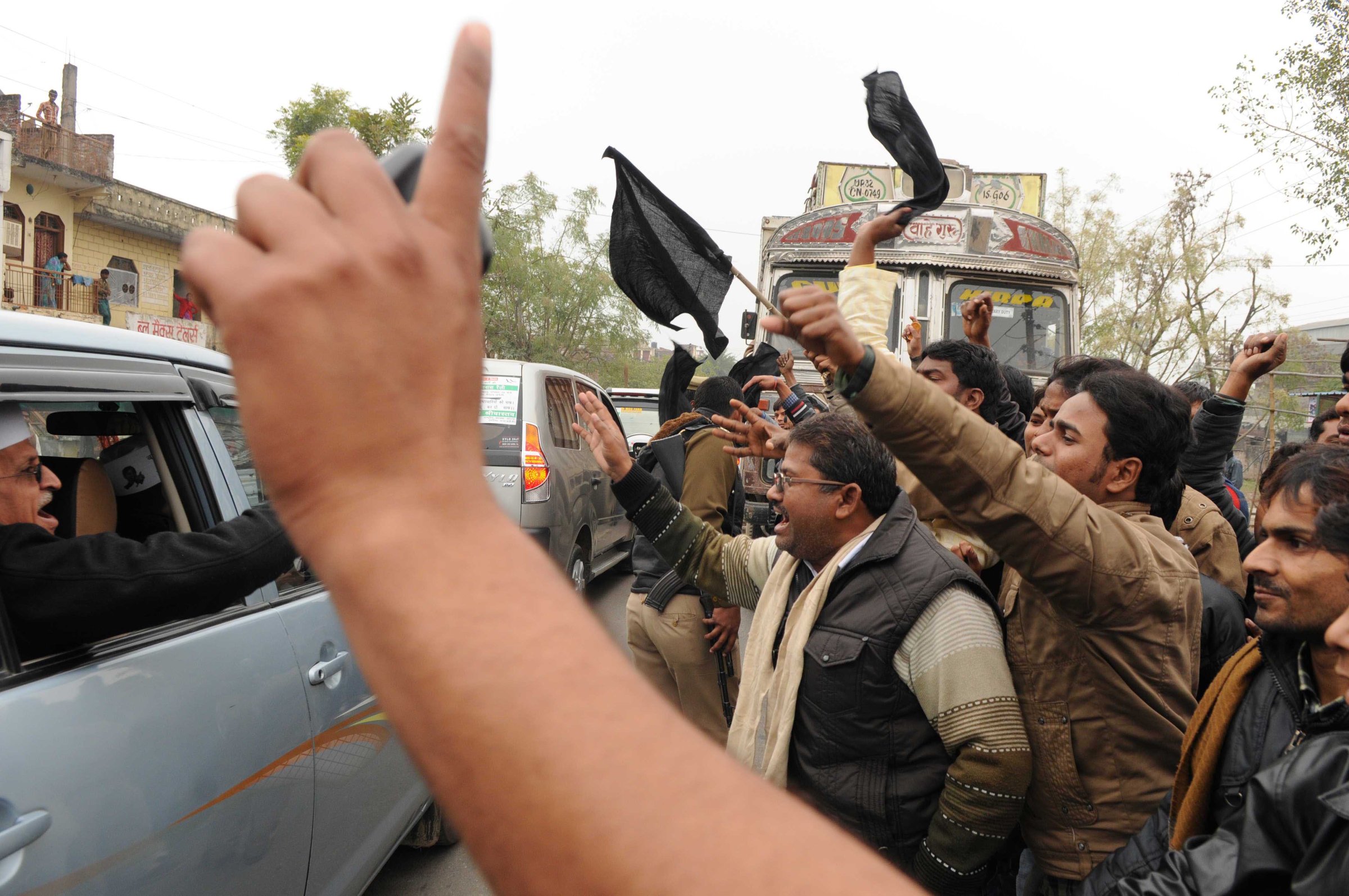
The headquarters of the Aam Aadmi Party (AAP) in the district of Amethi, Uttar Pradesh, are not much to look at. Cement shows through the thin layer of white paint covering the walls of what was once a basement storage area. Volunteers sit around on plastic chairs, sipping sugary tea out of melting plastic cups. The only swag in sight is a lonely t-shirt on sale for 50 rupees, bearing the slogan in Hindi: “Amethi will change. This country will change.”
But this kind of asceticism is perfectly fine when you are the new kid on the block in Indian politics and campaigning against “corruption and dynastic politics,” as Amogh Shankar, a teacher from Amethi and an AAP volunteer, puts it. “They are intricately connected,” he says.
The AAP has taken full aim at India’s ruling Congress Party. The party says that Congress, of which dynastic scion Rahul Gandhi is vice president, has led the Indian government down the path of corruption, and Amethi, where Gandhi happens to be the local parliamentarian, is one of AAP’s main targets.
In a few short weeks, more than 800 million voters are eligible to weigh in on that. National elections for Lok Sabha, India’s lower house of parliament, kick off on April 7, with results expected in mid May. In 2004, and again in 2009, the citizens of the Amethi constituency voted Rahul Gandhi in as their MP. Before that, Gandhi’s mother, Congress Party president Sonia Gandhi, held the seat, and earlier, it had belonged to Rahul’s father and the nation’s former Prime Minister, Rajiv Gandhi.
For many in this farming belt of northern India, that legacy is a matter of great pride. Not only have Amethi-ites elected some of India’s most powerful politicians, Congress supporters say the area has benefited during the decade that Gandhi has represented them. The scion’s critics, however, disagree, and chief among them is Kumar Vishwas, who is running on AAP’s ticket for Gandhi’s seat. A poet turned politician, Vishwas is spending the last cool days before summer on a village-to-village campaign to convince Amethi that his opponent’s time is up. “This is the most ignored constituency in Uttar Pradesh,” Vishwas said in an interview with TIME between rallies this week. “It was clear from day one that this seat would be a verdict on the dynasty of our party.”
Indeed, AAP’s fight in Amethi’s dusty village squares is about more than getting Vishwas a spot in Lok Sabha. Gandhi is not only running for a third term, he’s leading Congress’ election campaign, and could still be India’s next prime minister if the right coalition deal is struck. Since AAP gave Congress an unexpected drubbing in December’s New Delhi polls, the upstart party has taken its anti-corruption fight to the national stage. And while Vishwas vies for votes in Amethi, AAP leader Arvind Kejriwal, who did a brief stint as Delhi’s chief minister before stepping down last month, has taken on both Gandhi and Bharatiya Janata Party (BJP) prime ministerial candidate Narendra Modi in his own roadshow.
The BJP dismisses AAP as a serious contender. “I personally feel they are just cashing in on the hate of the common man for politicians,” says Rajiv Pratap Rudy, the BJP’s general secretary. Citing the fact that Kejriwal stepped down from office after he couldn’t get a new anti-corruption law passed, Rudy says, “at the end of the day, they behave like politicians.” Congress also slammed Kejriwal in February for quitting; a party spokesperson told the media the AAP leader was “a smooth liar who was looking for an excuse to run away.”
In Amethi, Vishwas’ campaign has inspired mixed feelings. One afternoon in the village of Sambhava, Vishwas stands in front of a small but enthusiastic crowd, wearing the marigold garlands required of any roving politician in India. Vishwas gears up the crowd, talking about the things he says his rival has not delivered: enough jobs, good roads, clean water, adequate health care. “The world is watching Amethi!” he shouts. Asking the young men to raise their hands, Vishwas urges them to join the AAP revolution.“Your children are going to ask you where you were when India’s second revolution took place. And you can tell them you were here with me!”
The day after the rally, a group of men from Sambhava gather outside an outdoor tea stall. The rough consensus seems to be — for that day at least — that many in Sambhava will vote for Vishwas. “These guys are real revolutionaries,” says Nand Lal Kashyap, a farmer who lives nearby. “We used to have this boundless faith, and now people are saying ‘no more.’ People are changing the way they think.”
Many of his neighbors may agree, but in other parts of Amethi, loyalty to the Gandhi family runs deep. Outside a busy storefront in Amethi town, Dharmendra Kumar, who works for Vodafone, admits he doesn’t have the same problems as many poorer residents of the area, and says perhaps Rahul Gandhi could be more accessible to his constituents. “Everyone wants change. That’s natural,” Kumar says. “But no one wants Rahul Gandhi to leave. He’s going to be the next Prime Minister. And in Amethi, we don’t produce MPs. We produce PMs.”
More Must-Reads from TIME
- Donald Trump Is TIME's 2024 Person of the Year
- Why We Chose Trump as Person of the Year
- Is Intermittent Fasting Good or Bad for You?
- The 100 Must-Read Books of 2024
- The 20 Best Christmas TV Episodes
- Column: If Optimism Feels Ridiculous Now, Try Hope
- The Future of Climate Action Is Trade Policy
- Merle Bombardieri Is Helping People Make the Baby Decision
Contact us at letters@time.com